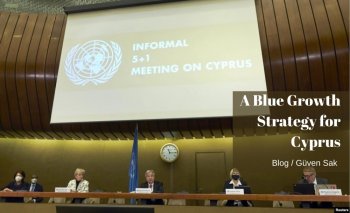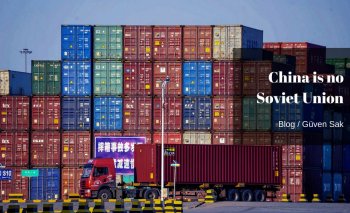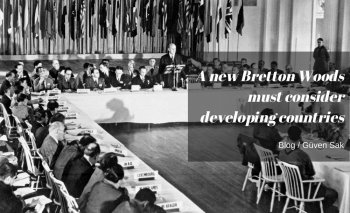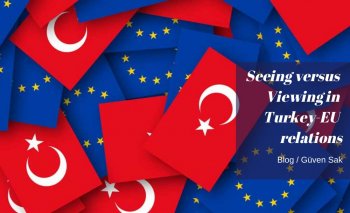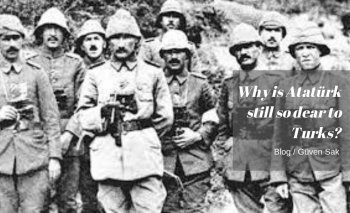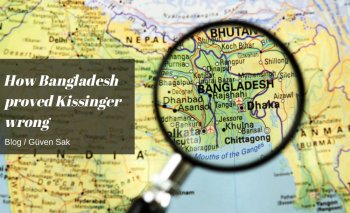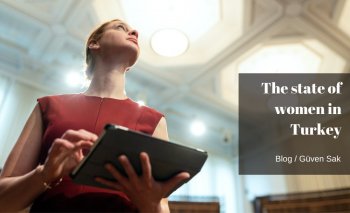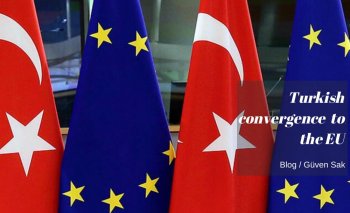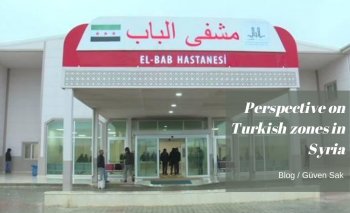A Blue Growth Strategy for Cyprus
Güven Sak, PhD
02 May 2021
While sitting in my office in Ankara, I was reading the Bruegel study on the “Geopolitical implications of the Green Deal,” which claims to be “a plan to decarbonize the EU economy by 2050, revolutionize the EU’s energy system, profoundly transform the economy and inspire efforts to combat climate change.”
[More]
China is no Soviet Union
Güven Sak, PhD
10 April 2021
According to the new IMF World Economic Outlook’s global growth estimates, there is light at the end of the tunnel. We are going to have a global recovery in 2021 and 2022, and guess what? The recovery is powered by two engines: the US and China. This is crucial to realize, since many are still are beating the drums of a cold war of sorts between the two giants, be it in trade, maritime borders, or any number of other issues. The world must not fall back on this instinct, especially not as we are nearing recovery from the pandemic.
[More]
A new Bretton Woods must consider developing countries
Güven Sak, PhD
04 April 2021
While giving a speech last week, Kristalina Georgieva, the managing director of the International Monetary Fund (IMF), started and ended her speech with quotes from Franklin D. Roosevelt’s message to the Congress, asking them to adopt the Bretton Woods Agreement: “The point in history at which we stand is full of promise and danger.” The moment Georgieva is invoking, of course, created the institutions she is currently presiding over. The United Nations Monetary and Financial Conference was held in July 1944 at the Mount Washington Hotel in Bretton Woods, New Hampshire to set the post-war rules of the global economic order. Delegates from 44 nations created a new international monetary system. That was the beginning of what we often call the rules-based international order and the new glob
[More]
Seeing versus Viewing in Turkey-EU relations
Güven Sak, PhD
28 March 2021
The Charlemagne column in last week’s The Economist magazine made a comparison between Turkey and Britain, both countries being “scrappy outsiders” to the EU. “On leaving the EU, Britain was always going to have a choice: Should it be more like Switzerland or Turkey?” wrote the columnist, suggesting that the Brits have decided to be contentious, like Turkey. Our leaders are begrudging and childish, it suggests, throwing stones and asking for comforts they are not entitled to. I disagree. It’s the wrong analogy. A better way to think about it is to reflect on the difference between seeing and viewing. Let me explain.
[More]
Why is Atatürk still so dear to Turks?
Güven Sak, PhD
21 March 2021
The British and French naval forces launched a campaign against the Turkish positions in the Dardanelles on March 18, 1915. They failed. The date has been drilled deep inside my head since childhood. On every March 18, my grandfather Ömer Kemal, may God rest his soul, use to start the day by asking all of us the significance of the date.
[More]
Three scores of Daily News
Güven Sak, PhD
16 March 2021
The Hürriyet Daily News (or “HDN,” as we call it) started life “three scores ago” as the Turkish Daily News on March 15, 1961. On this anniversary, I’d like to take the opportunity to reflect on how Turkey has changed in this time. Messy though it has been, I like to call this time the “grand transformation.” As this anniversary fits very nicely with my personal history, I see myself as a product of both the messiness and the grandness of it. Let me explain in five data points.
[More]
How Bangladesh proved Kissinger wrong
Güven Sak, PhD
14 March 2021
In 1971, Henry Kissinger called Bangladesh a “bottomless basket.” Five decades after its independence, Bangladesh is proving Kissinger utterly wrong. Working on South Asia at TEPAV about nine years ago, when the idea of the Istanbul-Zahidan-Islamabad train was first on the table, I came to be fascinated by the region.
[More]
The state of women in Turkey
Güven Sak, PhD
07 March 2021
The UNDP started issuing Human Development Reports in 1990. In the past three decades, there have been two countries that rapidly climbed the scales to reach the report’s “very high human development” category: Singapore and Turkey. Note that the populations of these countries are 5.6 million and 82 million, respectively.
[More]
Turkish convergence to the EU
Güven Sak, PhD
28 February 2021
Here is a great Albert Einstein quote: “If I had an hour to solve a problem, I’d spend 55 minutes thinking about the problem and five minutes thinking about solutions.” You need to first define problems, which will hopefully separate the significant facts from the trivial ones. Our European friends sometimes don’t think about the problem of Turkey clearly and fail to distinguish the essential from the trivial.
[More]
Perspective on Turkish zones in Syria
Güven Sak, PhD
21 February 2021
A news story featured in the New York Times about the Turkish-controlled zones in northern Syria has been in talks recently. The story quotes Jarir Sulaiman, a once-wealthy landowner in the village of Khiara in the south of Damascus and now living in one of the Turkish-controlled zones in Syria, saying “we won’t go back to our villages until Turkey gives us protection” and “we will not be able to survive without Turks.” The story reports on the relative safety of the zones and how there is still a long way to go in terms of improving the lives of their residents.
[More]
